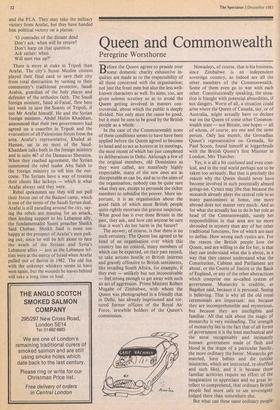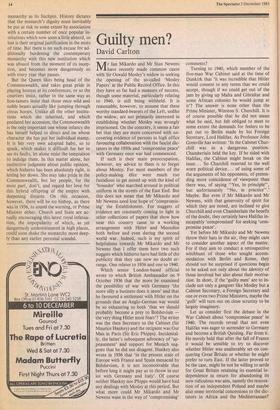Queen and Commonwealth
Peregrine Worsthorne
efore the Queen agrees to preside over .1-1P some domestic charity exhaustive in- quiries are made as to the respectability of all those concerned with the organisation; not just the front men but also the less well- known characters as well. Its aims, too, are given solemn scrutiny so as to avoid the Queen getting involved in matters con- troversial, about which the public is deeply divided. Not only must the cause be good, but it must be seen to be good by the British people as a whole.
In the case of the Commonwealth none of these conditions seems to have have been applied before the Queen agreed to become its head and to act as hostess at its meetings, the most recent of which has just completed its deliberations in Delhi. Although a few of the original members, old Dominions as they were called, are manifestly highly respectable, many of the new ones are as disreputable as can be, and as to the aims of the organisation, nobody can be quite sure what they are, except to persuade the richer members to subsidise the poorer. More im- portant, it is an organisation about the good faith of which most British people quite rightly entertain the gravest suspicion. What good has it ever done Britain in the past, they ask, and how can anyone be sure that it won't do her harm in the future?
The answer, of course, is that there is no such certainty. The Queen has agreed to be head of an organisation over which this country has no control, many members of which can be expected, on their past record, to take actions hostile to British interests and gravely offensive to British sentiments, like invading South Africa, for example, if they ever — unlikely but not inconceivable — feel strong enough to get away with such an act of aggression. Prime Minister Robert Mugabe of Zimbabwe, with whom the Queen was photographed in a friendly chat in Delhi, has already imprisoned and tor- tured former officers of the Royal Air Force, erstwhile holders of the Queen's commission.
Nowadays, of course, that is his business, since Zimbabwe is an independent sovereign country, as indeed are all the other members of the Commonwealth. Some of them even go to war with each other, Constitutionally speaking, the situa- tion is fraught with potential absurdities, if not dangers. Worst of all, a situation could arise where the Queen of Canada, say, or of Australia, might actually have to declare war on the Queen of some other Common- wealth state — not Britain, one hopes — all of whom, of course, are one and the same person. Only last month, the Grenadian Queen's representative on Grenada, Sir Paul Scoon, found himself at loggerheads with the British Queen's first Minister in London, Mrs Thatcher.
Yes, it is all a bit confused and even com- ical, and in the real world perhaps not to•be taken too seriously. But that is precisely the reason why the Queen should never have become involved in such potentially absurd goings-on. Cynics may jibe that because the monarch already plays the central role in so many pantomimes at home, one more abroad does not matter very much. And as for what she actually has to do in her role as head of the Commonwealth, surely her responsibilities in that area are no more shrouded in mystery than any of her other traditional functions, few of which are easy to define. How wrong such cynics are. For the reason the British people love the Queen, and are willing to die for her, is that they can understand what she is about, in a way that they cannot understand what the Constitution,' Cabinet and Parliament are about, or the Courts of Justice or the Bank of England, or any of the other abstractions which comprise our so-called system of government. Monarchy is credible, as Bagehot said, because it is personal. Seeing is believing. That is why all the old royal ceremonials are important: not because they are incomprehensible and mysterious, but because they are intelligible and familiar. All that talk about the magic of monarchy is very misleading. The strength of monarchy lies in the fact that of all forms of government it is the least mechanical and the most recognisably and intimately human: government made of flesh and blood in the shape of a particular family, the more ordinary the better. Monarchs get married, have babies and die (unlike ministries, which are instructed, re-shuffled and such like), and it is because these familiar actitivies require no effort of the imagination to appreciate and no great in- tellect to comprehend, that ordinary British people feel more safe to see sovereignty lodged there than somewhere else.
But what can these same ordinary people be expected to make of their Queen as head of the Commonwealth; their Queen as Queen of all sorts of other places, many of which are about as unlike the United Kingdom as it is possible to be? Did anybody ask the British people whether they wanted to share their Queen with a lot of other races? Of course not. The decision was taken as part of the process of imperial withdrawal, just as was the decision to allow unrestricted immigration, with the people as little consulted about sharing their Queen as about sharing their country. As a result, the British monarchy has ac- quired a multi-racial dimension scarcely less transforming than that experienced by the British nation itself, and if the identity of the latter has been obscured out of all recognition, so has the identity of the former.
So far, public opinion has been much more aware of what the Commonwealth has meant for the cohesiveness of the nation than of its atomising effect on the monarchy. But as the Grenada experience makes clear, there are no grounds for com- placency in this regard. Over whom, or what, does the Queen reign? Where do her loyalties lie? When the Australians depose her, as they certainly will before long, how are the British meant to take this humilia- tion to their Queen? Will they accept the sophistry that it won't be the British Queen who is insulted; only the Australian Queen and although the two are the same, they must never be confused, or put up for long with the shaming pretence of neutrali- ty under which the Queen, as head of the Commonwealth, must not be pro-British, or criticise ,black Commonwealth dictator- ships which torture her former officers, since that would be to take sides, which an Impartial head should never do. It takes all sorts to make a Commonwealth and the Queen must love them all equally.
Needless to say, the more the Queen suc- ceeds in identifying herself with so many contradictory roles, allows herself, that is, to be cut up into little pieces, the less whole, or even wholesome, will she appear in the eyes of her own people. For if one is right in suggesting that the secret of monarchy's hold over the imagination of the British people is the simplicity of the concept, which appeals to the heart, rather than the mind, then nothing is more likely to weaken that hold than the complications inherent in her Commonwealth reincarnation, the reality of which only constitutional experts can be expected to believe in, so utterly im- plausible, obscure and even unnatural must it seem to the rest of her subjects.
Conceivably the Commonwealth may serve some esoteric purpose as a bridge bet- ween North and South, or what have you; and even its conferences may not be the complete waste of time they sound and seem. But no such peripheral organisation, Wholly beyond the comprehension of or- dinary British people, and more often than not, in its language and actions, wholly out- side the range of their sympathies as well, should have been allowed to have the
monarchy as its linchpin. History dictates that the monarch's dignity must inevitably be put at risk to some extent by association with a certain number of once popular in- stitutions which now seem a little absurd, so lost is their original justification in the mists of time. But there is no such excuse fur ad- ditionally burdening the contemporary monarchy with this new institution which was absurd from the moment of its incep- tion, and becomes more dangerously so with every year that passes.
But the Queen likes being head of the Commonwealth, and takes great pride in playing hostess at its conferences, or so the courtiers insist, rather in the same way as lion-tamers insist that those once wild and noble beasts actually like jumping through circus hoops. Unlike all the other institu- tions which she inherited, and which predated her accession, the Commonwealth is the only important one whose infancy she has herself helped to direct and on whose character she has put her individual stamp. It is her very own adopted baby, so to speak, which makes it difficult for her to see its faults, let alone resist the temptation to indulge them. In this matter alone, her instinctive judgment about public opinion, which hitherto has been absolutely right, is letting her down. She may take pride in the Commonwealth, but her people, for the most part, don't, and regard her love for this hybrid offspring of the empire with deepening distaste. On this occasion, however, there will be no bishop, as there was in 1936, to sound the warning, or Prime Minister either. Church and State are ac- tually encouraging this latest royal infatua- tion, the unpopularity of which, as yet dangerously underestimated in high places, could soon shake the monarchy more deep- ly than any earlier personal scandal.
















































 Previous page
Previous page